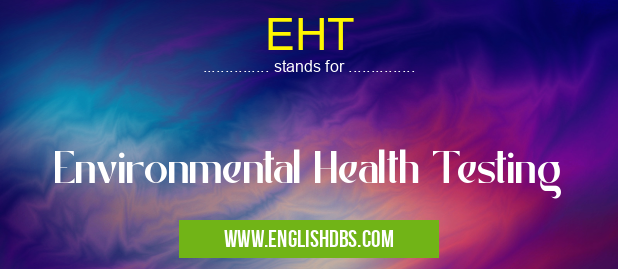What does EHT mean in HEALTHCARE
Environmental Health Testing (EHT) is a comprehensive analysis of various environmental factors to assess their potential impact on human health. It involves evaluating air, water, soil, and other environmental samples for the presence of harmful pollutants and contaminants. EHT plays a crucial role in identifying and mitigating potential risks to public health.

EHT meaning in Healthcare in Medical
EHT mostly used in an acronym Healthcare in Category Medical that means Environmental Health Testing
Shorthand: EHT,
Full Form: Environmental Health Testing
For more information of "Environmental Health Testing", see the section below.
» Medical » Healthcare
Importance of EHT
EHT is essential for:
- Protecting Human Health: Identifying potential health hazards in the environment allows for timely interventions and preventive measures to protect individuals from adverse health effects.
- Ensuring Environmental Compliance: Testing ensures compliance with environmental regulations and standards, mitigating the release of harmful substances into the ecosystem.
- Monitoring Environmental Trends: Tracking pollutant levels over time helps identify emerging issues and trends, allowing for proactive environmental management.
- Informing Decision-Making: EHT data provides valuable information for policymakers, regulators, and industry leaders to make informed decisions about environmental protection and resource allocation.
Types of EHT
EHT includes a wide range of testing methods, including:
- Air Quality Testing: Measures pollutants such as particulate matter, ozone, and heavy metals in the air.
- Water Quality Testing: Assesses the presence of contaminants like bacteria, chemicals, and heavy metals in water sources.
- Soil Quality Testing: Analyzes soil for pollutants such as pesticides, heavy metals, and volatile organic compounds.
- Noise Assessment: Measures sound levels to evaluate their potential impact on human health and well-being.
- Radiation Monitoring: Detects and quantifies ionizing and non-ionizing radiation in the environment.
Essential Questions and Answers on Environmental Health Testing in "MEDICAL»HEALTHCARE"
What is Environmental Health Testing (EHT)?
EHT is a comprehensive suite of tests that evaluate the presence and levels of environmental contaminants in various matrices, such as air, water, soil, and food. It helps assess the potential health risks associated with exposure to these contaminants.
Why is EHT important?
EHT provides valuable information about the quality of our environment and its potential impact on human health. By identifying and quantifying environmental contaminants, it enables scientists, policymakers, and individuals to make informed decisions to mitigate risks and protect public well-being.
What are the common contaminants tested for in EHT?
EHT can test for a wide range of contaminants, including:
- Chemicals (e.g., pesticides, heavy metals, volatile organic compounds)
- Microorganisms (e.g., bacteria, viruses, mold)
- Physical hazards (e.g., asbestos, lead paint)
- Allergens (e.g., pollen, pet dander)
- Radiological substances
How are EHT samples collected and analyzed?
EHT samples are collected following specific protocols to ensure accuracy and reliability. Samples are then analyzed using advanced analytical techniques, such as gas chromatography-mass spectrometry (GC-MS), liquid chromatography-mass spectrometry (LC-MS), and polymerase chain reaction (PCR).
Who can benefit from EHT?
EHT is valuable for:
- Homeowners and renters concerned about indoor air quality or potential contamination
- Businesses and industries seeking to comply with environmental regulations
- Government agencies monitoring environmental health hazards
- Healthcare professionals evaluating patient exposure to environmental triggers
- Researchers investigating the impact of environmental factors on human health
Final Words: EHT is a vital tool for safeguarding public health and ensuring environmental sustainability. By providing comprehensive information about environmental hazards, EHT helps identify and mitigate risks, protect human health, and make informed decisions about environmental management. As environmental concerns continue to evolve, EHT will remain a cornerstone of environmental protection efforts, ensuring a healthier and more sustainable future for generations to come.
EHT also stands for: |
|
| All stands for EHT |
